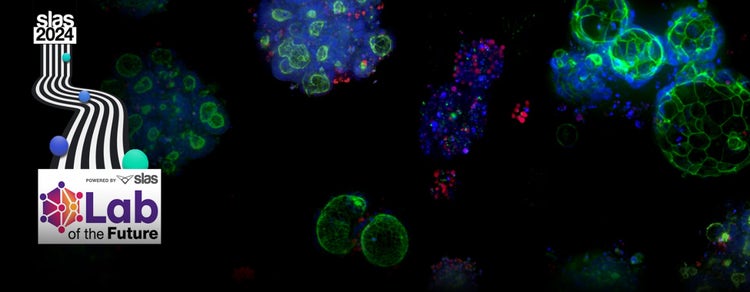
Journey into the Lab of the Future: Molecular Devices' Visionary Posters at SLAS 2024
Molecular Devices is honored to be designated as a “Lab of the Future Company.”
SLAS2024 미래 실험실로 지정된 참가업체는 단순한 자동 계측을 넘어서 현재 기술의 경계를 넓히고 실험실 공간에서 자동화 실험과정을 완벽하게 통합하는 새로운 경지를 개척하는 솔루션을 제공할 수 있는 역량을 입증했습니다.
Explore six posters that feature this groundbreaking innovation and unveil the latest advancements in laboratory research and technology. These posters delve into the world of AI-driven decision-making, automated cell culture, organoid research, and precision medicine, showcasing the potential for pioneering discoveries. Discover the future of cell culture and how automation is revolutionizing reproducibility and standardization while uncovering the promise of patient-derived organoids in improving therapeutic outcomes. We demonstrate a streamlined process for assessing drug effects on 3D cancer spheroid and then dive into the realm of neurospheres and their role in modeling Alzheimer's disease.
Take a step ‘back to the future’ and revisit us at SLAS 2024 - Lab of the Future, where science and technology converge to shape the future of medicine.
CellXpress.ai Automated Cell Culture System: Automated workstation for reproducible organoid cultivation
Felix Spira, PhD
Hardware Engineering and Applications Manager
The CellXpress.ai system is a highly integrated organoid generation and cultivation workstation that integrates cutting-edge hardware and software technologies with advanced biological science to automate and standardize the 2D and 3D cell culture process. From maintenance, monitoring, and incubation through imaging, analysis, and data processing, the CellXpress.ai cell culture system delivers consistent, unbiased, and biologically relevant results at scale. To support scientists at every level of their organoid research, the system guides the user to set up and execute iPSC, tumoroid, and adult stem cell-derived organoid workflows.
As proof of concept, Dr. Spira demonstrates the successful cultivation of iPSC and human intestinal organoid workflows over multiple passages. The workflows include cell/organoid seeding, feeding, and passaging, with in-line monitoring and machine-learning image analysis and classification.
Scalable patient-derived 3D colorectal cancer organoids in high throughput applications
Angeline Lim, PhD
Sr. Applications Scientist
In this poster, Dr. Lim addresses the challenges associated with the use of PDOs and demonstrates their utility for high throughput applications. She describes an end-end, automated workflow starting with assay-ready colorectal cancer (CRC) organoids expanded in a bioreactor.
- Developed a semi-automated process for the controlled production of PDOs. The bioreactor maintains an environment that ensures constant delivery of nutrients and growth factors to the culture while preventing the accumulation of toxins. This method results in the large-scale production of assay-ready organoids that are uniform in size and have high viability.
- Developed automation methods to streamline the handling of organoid-based assays.
- Developed image-based deep learning model for the analysis
- Show the use of a high dimensionality approach for organoid profiling
A walkaway solution for assessing drug effects on patient-derived cancer organoids
Cathy Olsen, PhD
Sr. Application Scientist
Characterization of organoid response to candidate drug treatment is a powerful research tool that provides a wealth of detailed information, but screening a large number of compounds requires significant effort and hands-on time. Streamlining the process is important for rapid identification of compounds that can be followed up with more time-consuming studies. In this poster, Dr. Olsen demonstrates the methods for analyses of key parameters such as cell viability that allow rapid identification of effective drug candidates and can be combined or followed up with more complex image analysis. The results from viability assays are further hastened through the automation of reagent and plate handling, as well as pre-configured analysis protocols.
Automation of the full workflow for 3D cancer spheroid assays with CellXpress.ai Automated Cell Culture System
Oksana Sirenko, PhD
Sr. Scientist Assay Development
In this poster, Dr. Sirenko describes how she automated the cell culture process and end-point assays to scale up complex 3D cell-based assays and compound screening. She then shares how how we developed cell culture methods automation methods using the CellXpress.ai Automated Cell Culture System. The CellXpress.ai system enables full automation of 2D or 3D assays for prolonged complex workflows and provides automated plating, passaging, media exchanges, and organoid monitoring, along with compound treatment and endpoint assays.
Functional characterization of healthy and Alzheimer’s disease-related 3D neurospheres formed using Human iPSC-derived glutamatergic neurons, GABAergic neurons, and astrocytes
Prathyushakrishna Macha, Ph.D.
Oksana Sirenko, PhD
Download our poster to learn how this biological system of 3D neurospheres assembled from human iPSC-derived cell types demonstrates a promising tool for disease modeling and compound testing.
Transform the complexities of 3D cell culture into a reliable and translatable science: Automation of 3D organoid culture and organoid analysis.
Oksana Sirenko, PhD
Sr. Scientist Assay Development
To alleviate the bottlenecks that come with labor-intensive manual protocols, we developed the CellXpress.ai Automated Cell Culture System. This revolutionary solution automates the entire organoid culture process for prolonged, complex workflows. The CellXpress.ai system uses machine learning to autonomously manage media exchange, plating, passaging, organoid monitoring, endpoint assays, and complex image analysis. Here we present results from the automation of several commonly used organoid protocols, including the culture of 3D organoids in matrix domes or in low attachment plates.
Here, Dr. Sirenko presents the results from the automation of several commonly used organoid protocols, including the culture of 3D organoids in matrix domes or in the low attachment plates.
The future of cell culture backed by machine learning and data-driven science
Feeling inspired to learn more exciting new methods and protocols to automate your complex biology workflows? Click below to start your journey into the...